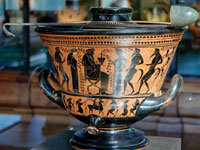Princeton museum to return 8 disputed antiquities to Italy
The Princeton University Art Museum will return eight disputed antiquities to Italy. The Italian Culture Ministry and the Princeton Museum signed a deal for this restitution.

Under the deal, the New Jersey museum will transfer legal title to Italy of eight ancient artifacts including pottery and sculpture from the Greek and Etruscan cultures, the ministry said in a statement.
Half of the objects will be handed over within the next 60 days, while the other four will remain at the museum until 2011. In exchange, Italy will loan Princeton other treasures of "equal historical-artistic interest," the statement said, without specifying.
The two sides will also increase cultural cooperation through joint exhibitions and archaeological digs, while Princeton will keep seven other objects that had been part of the negotiations, the museum said in a statement issued Friday to announce the upcoming deal.
The agreement enables Princeton "to retain a number of objects, repatriate others that belong to Italy, and have unprecedented access, on a long-term loan basis, to additional material," said museum director Susan Taylor.
Among the objects covered by the deal is a prized "psykter" - a Greek vase decorated with red figures that was used for cooling wine.
Made in Athens around 500 B.C., a period of unequaled mastery for pottery in the ancient world, the vase was imported by the Etruscans culture that dominated central Italy.
Italian authorities contend the vase was looted by tomb raiders from the Etruscan site of Cerveteri, north of Rome, and sold to Princeton for US$350,000 in 1989 by an American art dealer.
The psykter is one of the four pieces to remain on loan in Princeton for four years. The returning objects include a 6th-century B.C. Etruscan statue depicting the head of a winged lion and other vases from Greece and southern Italy painted with mythological themes.
The agreement follows similar deals signed by other top U.S. museums to return antiquities that Italy claims were smuggled out of the country and sold to collections and institutions worldwide.
So far, artifacts including statues, silverware, frescoes and vases from Roman, Greek and Etruscan times have been the object of deals with the Metropolitan Museum in New York, Boston's Museum of Fine Arts and the J. Paul Getty Museum in California.
"The Princeton deal is an important step in the Italian government's efforts of cultural diplomacy," said Culture Minister Francesco Rutelli.
Italian authorities are still in negotiations with other museums across the globe, and the judiciary in Rome is pressing on with the criminal prosecution of former Getty curator Marion True and art dealer Robert Hecht.
The two Americans, on trial in Rome, are accused of knowingly acquiring dozens of ancient artifacts that authorities maintain were stolen or unearthed illegally and smuggled out of Italy. Both defendants deny wrongdoing.
Italy contends that museums around the world have bought artifacts that, like Princeton's psykter, were illegally obtained by Hecht and other dealers.
Subscribe to Pravda.Ru Telegram channel, Facebook, RSS!


